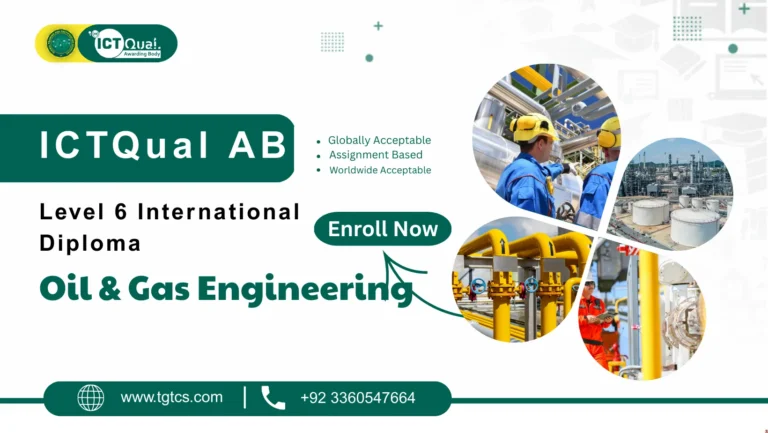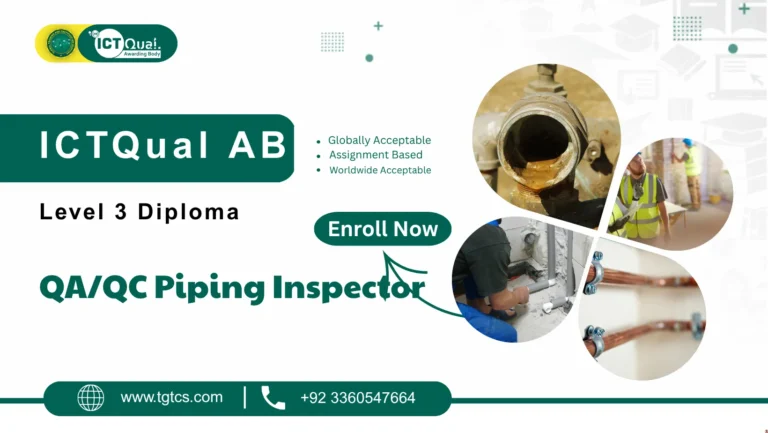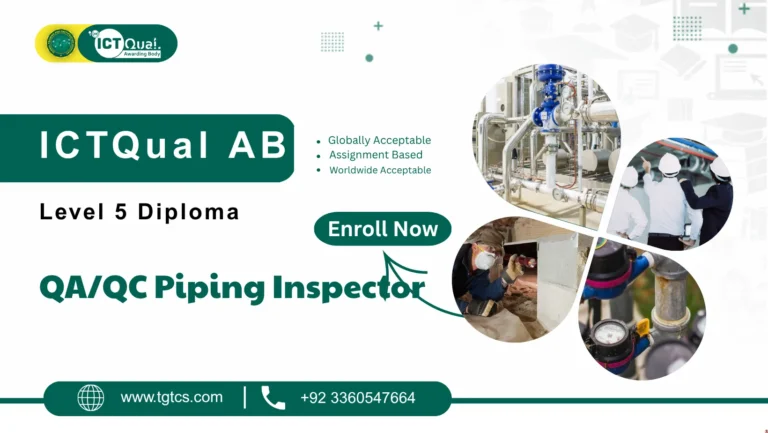ICTQual AB Level 6 International Diploma in Quantity Surveying
The ICTQual AB Level 6 International Diploma in Quantity Surveying is a globally recognized program designed to equip learners with advanced expertise in construction cost management, project planning, and financial control within the civil engineering and construction sectors. In today’s fast-paced global construction industry, the demand for skilled quantity surveyors is higher than ever, making this diploma an essential step for professionals aiming to build a sustainable and rewarding career.
This international diploma in quantity surveying provides comprehensive knowledge covering cost estimation, budgeting, contract management, risk analysis, procurement, and project evaluation. Learners will gain in-depth skills to effectively manage construction costs, enhance resource efficiency, and ensure compliance with legal and regulatory frameworks. The program also emphasizes practical applications, enabling candidates to handle real-world challenges in mega projects, infrastructure development, and sustainable construction practices.
Fully assignment-based and flexible, the ICTQual AB Level 6 Diploma in Quantity Surveying allows learners to study at their own pace from anywhere in the world. With British Council verifiable, MOFA and Embassy attested certification, it is widely accepted for professional recognition, job opportunities, and iqama approval in Gulf countries and beyond.
Graduates of this program will be well-prepared for careers in construction firms, consultancy practices, real estate development, and government infrastructure projects. Whether you are a fresh graduate entering the industry or an experienced professional seeking to upgrade your credentials, this advanced diploma in quantity surveying offers the perfect pathway to excel in both local and international markets.
The Global Training and Certification Services is Approved Training Centre of ICTQual AB UK Ltd
The ICTQual AB Level 6 International Diploma in Quantity Surveying is a prestigious and globally recognized qualification designed to prepare learners for leadership roles in construction cost management, budgeting, and project planning.
Course Level and Credits
- Level 6 International Diploma with 360 credits
- Equivalent to a bachelor’s level qualification in construction and cost management
- Designed for professionals, students, and engineers aiming to advance in quantity surveying and construction project management
Mode of Study
- 100% assignment-based learning
- Flexible, self-paced study accessible from anywhere in the world
- Ideal for working professionals balancing career and education
Global Recognition & Attestation
- British Council verifiable certification
- MOFA and Embassy attested, making it valid internationally
- Highly recognized for job opportunities and iqama approval in Gulf and global markets
Scope and Purpose
- Focused on construction cost management, contracts, procurement, and project budgeting
- Covers legal frameworks, sustainability, risk management, and infrastructure development
- Prepares learners to handle real-world construction and civil engineering challenges
Pathways for Fresh and Experienced Learners
- Fresh candidates: Complete 36 mandatory assignments within 3 years
- Experienced professionals: Fast-track option by submitting 6+ years of verifiable industry experience and defending knowledge in professional discussion meetings with ICTQual AB approved assessors
Career Benefits
- Opens global career opportunities in consultancy firms, construction companies, real estate development, and infrastructure projects
- Enhances professional credibility with a recognized international diploma in quantity surveying
- A pathway to senior-level positions in project and cost management
Mandatory Unit
This qualification, the ICTQual AB Level 6 International Diploma in Quantity Surveying, consists of 36 mandatory units.
Year 1 – Foundation in Quantity Surveying
- Principles of Quantity Surveying
- Introduction to Construction Projects
- Construction Materials and Methods
- Project Planning and Scheduling
- Risk Assessment and Management
- Health, Safety, and Environmental Awareness
- Project Communication and Stakeholder Management
- Construction Technology Fundamentals
- Financial Management in Construction
- Quality Assurance and Control
- Legal and Regulatory Frameworks in Construction
- Professional Ethics and Conduct
Year 2 – Intermediate Quantity Surveying Practices
- Advanced Project Planning Techniques
- Resource Management and Allocation
- Project Cost Estimation and Budgeting
- Construction Contract Administration
- Procurement and Supply Chain Management
- Project Risk Analysis and Mitigation
- Leadership and Team Management
- Site and Workshop Management
- Sustainability and Environmental Management
- Project Monitoring and Reporting
- Problem-Solving and Decision-Making in Projects
- Communication and Negotiation Skills
Year 3 – Advanced Quantity Surveying and Strategic Leadership
- Strategic Quantity Surveying and Project Management
- Advanced Construction Cost Planning
- Infrastructure Project Management
- Innovation in Construction Projects
- Advanced Risk and Crisis Management
- Contract Management and Legal Compliance
- Leadership in Construction Projects
- Advanced Project Control and Performance Measurement
- Project Governance and Compliance
- Research Methods and Project Analysis
- Capstone Project in Quantity Surveying
- Professional Development and Career Planning
The ICTQual AB Level 6 International Diploma in Quantity Surveying equips learners with advanced knowledge and practical expertise in construction cost management, contract administration, and strategic leadership in civil engineering projects.
Year 1 – Foundation in Quantity Surveying
Principles of Quantity Surveying
- Understand the core roles and responsibilities of a quantity surveyor in construction projects
- Apply basic cost estimation, measurement, and valuation methods
- Demonstrate knowledge of procurement processes and tendering procedures
- Develop analytical and problem-solving skills relevant to cost management
Introduction to Construction Projects
- Identify the key phases of construction project lifecycles
- Understand the roles of stakeholders in civil engineering projects
- Apply project documentation and reporting standards
- Recognize the importance of sustainability in construction planning
Construction Materials and Methods
- Evaluate different construction materials and their applications
- Understand construction techniques for various building structures
- Apply sustainable material selection methods
- Assess quality, durability, and cost-effectiveness of materials
Project Planning and Scheduling
- Apply project scheduling tools and techniques such as Gantt charts and CPM
- Understand critical path method (CPM) and project milestones
- Develop resource allocation and time management skills
- Create practical construction timelines for different project types
Risk Assessment and Management
- Identify potential risks in construction projects
- Apply risk analysis techniques to minimize hazards
- Develop mitigation strategies for financial, operational, and legal risks
- Ensure compliance with health, safety, and regulatory frameworks
Health, Safety, and Environmental Awareness
- Apply international standards for construction site safety
- Develop emergency response and safety protocols
- Understand environmental impacts of construction projects
- Implement eco-friendly and sustainable practices on site
Project Communication and Stakeholder Management
- Communicate effectively with clients, contractors, and project teams
- Apply negotiation skills in resolving conflicts and disputes
- Develop stakeholder engagement strategies
- Prepare professional reports and presentations
Construction Technology Fundamentals
- Understand modern construction technologies and innovations
- Apply IT and digital tools for construction project management
- Assess the impact of smart technologies on project efficiency
- Recognize the role of Building Information Modelling (BIM) in construction
Financial Management in Construction
- Apply principles of budgeting and financial planning in construction
- Develop cost monitoring and financial reporting skills
- Understand cash flow and capital management for projects
- Analyze financial risks and profitability in project execution
Quality Assurance and Control
- Apply quality standards in construction processes
- Conduct inspections and audits for project quality
- Develop continuous improvement strategies in quality management
- Understand ISO and international compliance standards
Legal and Regulatory Frameworks in Construction
- Understand construction-related legal requirements and contracts
- Apply compliance with international and national building codes
- Recognize the impact of legislation on construction projects
- Manage disputes through legal frameworks and arbitration
Professional Ethics and Conduct
- Apply professional standards of ethical behavior in construction
- Recognize the role of integrity in project management
- Understand corporate social responsibility in construction
- Demonstrate professional accountability in cost management
Year 2 – Intermediate Quantity Surveying Practices
Advanced Project Planning Techniques
- Apply advanced planning tools and software in construction projects
- Develop resource-loaded schedules for complex projects
- Implement project baseline monitoring and tracking methods
- Integrate planning with cost and resource management
Resource Management and Allocation
- Develop strategies for labor, equipment, and material allocation
- Apply optimization techniques for resource efficiency
- Monitor and control usage of project resources
- Manage resource-related disputes and shortages
Project Cost Estimation and Budgeting
- Apply advanced cost estimation techniques for large projects
- Prepare detailed bills of quantities (BoQ) and cost plans
- Monitor project budgets against actual expenditures
- Forecast cost variations and provide financial solutions
Construction Contract Administration
- Understand principles of contract law in construction
- Manage contract documentation and administration processes
- Apply dispute resolution methods in contractual disagreements
- Ensure compliance with terms and obligations of contracts
Procurement and Supply Chain Management
- Develop procurement strategies for construction projects
- Understand supplier evaluation and vendor selection
- Apply inventory and logistics management techniques
- Assess the impact of supply chain efficiency on project delivery
Project Risk Analysis and Mitigation
- Apply quantitative and qualitative risk analysis methods
- Develop project risk registers and contingency plans
- Implement advanced mitigation strategies in construction projects
- Ensure compliance with risk management standards
Leadership and Team Management
- Apply leadership theories in managing construction teams
- Develop motivation and performance improvement strategies
- Resolve conflicts within project teams
- Enhance collaboration across multidisciplinary teams
Site and Workshop Management
- Understand the roles and responsibilities in site management
- Apply workshop and equipment management techniques
- Monitor health, safety, and efficiency on construction sites
- Control daily operations and supervise site progress
Sustainability and Environmental Management
- Integrate sustainable practices in construction projects
- Apply green building standards and energy efficiency methods
- Assess environmental impacts of construction activities
- Develop strategies for eco-friendly project delivery
Project Monitoring and Reporting
- Track construction project performance against KPIs
- Apply Earned Value Management (EVM) for cost and schedule control
- Develop progress and performance reports for stakeholders
- Implement corrective actions to address project variances
Problem-Solving and Decision-Making in Projects
- Apply structured decision-making tools in construction projects
- Analyze problems using root-cause analysis methods
- Develop innovative solutions to project challenges
- Evaluate outcomes and ensure continuous improvement
Communication and Negotiation Skills
- Apply effective communication techniques in project environments
- Use negotiation strategies to achieve project goals
- Resolve conflicts and disputes through constructive dialogue
- Develop stakeholder confidence through transparent communication
Year 3 – Advanced Quantity Surveying and Strategic Leadership
Strategic Quantity Surveying and Project Management
- Apply advanced strategies for construction cost planning
- Develop organizational policies for project success
- Manage complex projects at national and international levels
- Integrate strategic goals with project management practices
Advanced Construction Cost Planning
- Prepare cost models for infrastructure and mega projects
- Forecast long-term financial implications of projects
- Apply life-cycle costing and value engineering techniques
- Monitor cost trends and benchmark industry standards
Infrastructure Project Management
- Manage infrastructure projects such as highways, bridges, and utilities
- Apply resource planning for large-scale civil projects
- Understand global infrastructure development trends
- Ensure compliance with regulatory and environmental requirements
Innovation in Construction Projects
- Apply modern innovations like BIM and digital tools
- Understand the role of AI, robotics, and smart tech in construction
- Develop strategies for adopting emerging technologies
- Assess the impact of innovation on cost and productivity
Advanced Risk and Crisis Management
- Identify and manage risks in mega projects
- Develop crisis management strategies and emergency protocols
- Apply resilience planning for large construction operations
- Monitor project recovery processes after disruptions
Contract Management and Legal Compliance
- Manage international construction contracts and agreements
- Apply FIDIC and standard form contracts in practice
- Ensure compliance with global legal frameworks
- Resolve disputes through arbitration and mediation
Leadership in Construction Projects
- Lead multidisciplinary teams in complex projects
- Develop organizational change and transformation strategies
- Apply advanced leadership styles in dynamic environments
- Enhance employee engagement and productivity
Advanced Project Control and Performance Measurement
- Apply earned value and performance metrics in projects
- Monitor project KPIs for time, cost, and quality
- Implement benchmarking practices against global standards
- Develop continuous improvement strategies for performance
Project Governance and Compliance
- Apply governance frameworks in construction management
- Ensure compliance with corporate and industry regulations
- Understand the role of transparency and accountability
- Develop governance strategies for risk control
Research Methods and Project Analysis
- Apply research methodologies in construction studies
- Conduct data collection and statistical analysis
- Prepare professional research reports and findings
- Critically evaluate construction project case studies
Capstone Project in Quantity Surveying
- Apply knowledge gained throughout the course in a major project
- Demonstrate advanced cost planning and project control skills
- Present innovative solutions for real-world project issues
- Defend research outcomes in professional discussions
Professional Development and Career Planning
- Develop a professional career plan in quantity surveying
- Build a portfolio showcasing project and cost management skills
- Apply continuous professional development (CPD) strategies
- Prepare for senior roles in global construction and consultancy
The ICTQual AB Level 6 International Diploma in Quantity Surveying offers a wide range of academic, professional, and career-oriented benefits. It is designed to enhance learners’ technical expertise, management capabilities, and employability in the global construction and surveying industry.
Global Recognition and Credibility
- British Council verifiable, MOFA, and Embassy attestable certification
- Accepted internationally, opening opportunities across different countries
Career Advancement Opportunities
- Prepares learners for senior roles in construction and cost management
- Increases employability in both public and private sector projects
Flexibility in Learning and Assessment
- 360-credit, assignment-based diploma that can be completed at one’s own pace
- Suitable for both fresh graduates and experienced professionals
Practical Knowledge and Industry Relevance
- Focus on real-world case studies, project simulations, and industry applications
- Covers advanced skills in cost estimation, contract management, and project leadership
Pathway to Further Education and Professional Growth
- Provides a solid foundation for postgraduate studies in construction or project management
- Enhances professional profile for memberships in global surveying and engineering bodies
The ICTQual AB Level 6 International Diploma in Quantity Surveying is designed for a wide range of learners who aspire to build strong careers in construction, cost management, and surveying. It caters to both fresh learners and experienced professionals aiming to enhance their expertise and recognition.
Fresh Graduates in Construction and Engineering
- Looking to gain a professional qualification that improves employability.
- Seeking to build a solid foundation in quantity surveying practices.
Experienced Construction Professionals
- Already working in construction or project management and want to formalize skills.
- Interested in upgrading qualifications for career progression and promotions.
Career Changers Entering the Construction Industry
- Professionals from other fields wishing to transition into surveying and construction.
- Require flexible, assignment-based learning to balance work and studies.
International Job Seekers
- Aiming to secure jobs abroad with a globally recognized, embassy-attestable qualification.
- Seeking certifications that support visa, iqama, and overseas career approval.
Future Postgraduate and Professional Membership Aspirants
- Planning to pursue higher education in construction management or related fields.
- Interested in gaining credentials that support membership in professional bodies.
This course is ideal for ambitious learners who want to combine theoretical knowledge with practical applications and achieve recognition in the competitive global construction industry.
Course Overview
Course Level
Level 6
Course Units
36 Units
Credits
360
Duration
3 years






